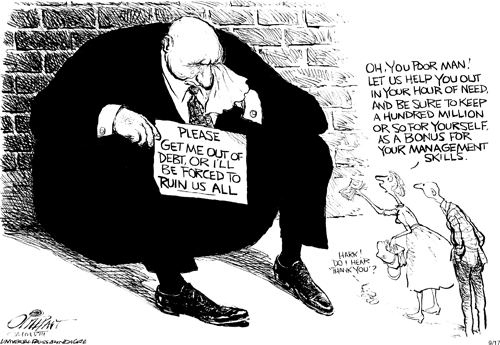Now that the "Rescue" bill has been enacted, all we can do is continue being consumers in the economy and sit back and watch the effects of this plan on our economy. Since the state of our economy is so revolting, it is clear that McCain and Obama’s economic plans should be fully comprehensible for the American voters in order to make a rational vote in the fast-approaching election. Here, I am going to explore McCain’s and Obama’s extensive economic strategies to restore our failing economy.
Let’s start with Obama since his Vice President, Joe Biden, undoubtedly took the gold in last Thursday's Vice Presidential debate.
First, we’ll look at Obama’s view on the economy and how it has reached such an unprecedented low. Obama points fingers mainly at Wall Street, CEO’s and investors when asked who the culprits were behind the problem in an interview on "60 Minutes." In this interview, Obama emphasized how important it is to have a regulatory system that checks on greedy, powerful Americans.
One huge problem Americans today face is the rapidly inreasing rate of unemployment. Obama poses several solutions to the issue of unemployment in the United States, one of which is known as the Advanced Manufacturing Fund. Originating in Michigan, Obama plans to nationalize this motivation for manufacturers to create new products and jobs in order to be rewarded over $125 million. This plan sounds terrific, but Obama has yet to provide substantial evidence for how he plans to fund this.
Another aspect of Obama’s economic plan is to provide tax relief for the middle class. Obama and Biden plan to cut income taxes by $1,000 for middle class Americans. The Obama-Biden administration has stressed a lot about restoring “fairness” back into taxes; they plan to implement a program called "Making Work Pay" will completely eliminate salary taxes for 1 million Americans. Wow! If think how much money a McDonald’s employee will make per hour without having to pay taxes on their salary. Most importantly, the Obama-Biden administration has a two-part plan to jump-start the economy. One of these parts contains a $25 billion State Growth Fund to protect Americans from health, education, housing, and heating cuts. Also, to provide more jobs for Americans Obama also plans to give $25 billion in a Jobs and Growth Fund program to implement road and bridge construction—which he estimates will provide over 1 million jobs.
These programs sound terrific and very plausible; however, I am still unsure and very curious as to where Obama is planning on getting all of this money from.
Now, let’s take an in-depth look into the McCain-Palin economic plan. I’m going to be honest and say that when comparing Obama’s economic plan to McCain’s economic plan, right off the bat I notice that Obama has already formulated programs to restore the economy, while McCain’s national website mainly focuses on his past programs rather than what his plans to restore the present-day failing economy we have in our hands.
First of all, just three weeks ago McCain claimed that our economy was "strong". Was this a joke? Seriously? Gas prices have been insanely high, food prices at restaurants have increased, and the stock market was beginning to show signs of failure. Our current President Bush had even already noted the failing economy. The following Tuesday McCain began pointing fingers, which clearly indicates that there is a grave issue in our economy. McCain, like Obama, turned to Wall Street to lay blame on the economic crisis—I agree with this move. The problem that worries me with McCain is the fact that he even claimed that he was not as informed on economic issues as he probably should be. This is a scary attribute to have when helpless Americans are turning to the presidential candidates to pull us out of the economic slump that is affecting so many families.
McCain’s only program is called the the National Commission on Workplace Flexibility and Choice. McCain clearly expresses that he believes families shouldn’t sacrifice core values simply due to inflexibility in the workplace. This program only touches on the preservation of family rather than exploring ways to increase job availability in the United States. Hm...
When dealing with the prominent issue of our economy, the main focus should be on what the people want. Since the presidential candidates are fighting to be a potential representative of the constituents, I think that it is very important to research about what Americans are craving in a President.
Of the issues from the 2008 election, there is the obvious, most important concern—the bailout bill and the economy. In a national CNN/Opinion Research Corp. poll of more than 1,000 Americans, the results showed that 62% of Americans think the government should intervene with the free market system and try to fix the problems of our financial institutions. However, research shows that Americans are holding a double-standard for politicians because Americans are against the “rescue” bill. The reasoning behind their fear is the burden that the bill will have on taxpayers.
Did you watch the Presidential debate on Tuesday night? During the Presidential debate on October 7, 2008, Barack Obama and John McCain spent half of the time discussing the economy. Since the Presidential debate was set up in a Town Hall style, where the audience was full of undecided voters, McCain and Obama’s questioning was derived from the audience. Of course, the first question that was posed dealt with the financial crisis—“What are the presidential candidates planning on doing to protect retired and older citizens who are losing their incomes?” McCain and Obama, of course, responded to this question by blaming each other for supporting the corruption in the financial system.
Watch the next, and last, Presidential debate of the 2008 election on October 15, 2008! Stay tuned to my blog for more updates on the candidates’ stances on the “rescue” plan and for their own plans to rescue our economy.

